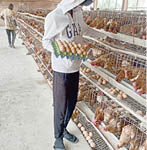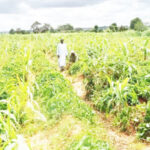In the last four years, the poultry industry in Nigeria has faced many daunting challenges, leading to the collapse of many farms.
The COVID-19, foreign exchange, naira redesign, cashless policy crises, avian influenza, insecurity and cost of feeds, were the worst problems the industry has faced in decades, pushing many smallholder farmers out of business.
It all started in 2019 when the COVID pandemic hit the world, leading to the collapse of international businesses, and the imposition of restrictions and lockdowns across countries.
Farmers suffered severe losses due to lockdowns, which affected the market for eggs and other poultry products.
- Six factors Abia gov-elect rode on to boot PDP out of power
- Father of 6 bags 12 months in jail for illegal mining in Kwara
The Nigerian poultry industry, according to statistics from the Food and Agriculture Organisation (FAO) of the United Nations, has the second largest chicken population in Africa after South Africa, producing 650,000 tons of eggs.
Dr Onallo Akpa, the Director-General, Poultry Association of Nigeria, painted the economic picture of the eggs in Nigeria, which is enormous. He said an egg a day for 50% of the Nigerian population will produce a daily economic value of N1.7 billion.
Annual revenue from egg sales will be N340 billion. If per capita consumption of eggs increases to 100 eggs per person per year, then annual revenue would be N620 billion, he stated.
Industry lost N1.5trn to COVID
The Poultry Association of Nigeria (PAN) estimated that the poultry industry lost about N1.5 trillion to the effects of the COVID-19 pandemic.
“Factories were forced to bury their day-old chicks because they could not sell them, and eggs were buried because they were not picked up from the farms due to lockdown, which is unfortunate.
“Even the chicks that managed to come out of the factories, died because of suffocation; farms were forced to sell off birds due to the cost of feed.
“Then for the feed millers, even getting the raw materials became a big problem. So conservatively, what we can quantify in terms of loss, is about N1.5 trillion for the poultry industry,” he said, while expatiating on the impact of COVID-19.
Naira redesign caused N30bn loss
In the last three months of the cashless policy (January to March), farmers lost eggs worth N30 billion due to glut.
The poultry farmers also said they lost over 15 million crates of eggs worth N30 billion due to the federal government’s cashless policy and naira redesign.
Last week, the Poultry Association of Nigeria (PAN) raised an alarm in a press statement by its national president, Chief Sunday Ezeobiora, and director-general, Mr Onallo Akpa, released in Abuja saying that the farmers suffered severe losses as a result of they are in financial crisis.
“The average loss to the poultry industry was over N30 billion. Except for some measures of immediate intervention taken by the federal government, the poultry industry in the country is on the verge of total collapse.
“Most of the poultry farmers are now debtors to commercial banks and suppliers of raw materials and other services,” the statement reads in part.
The farmers described the Nigerian poultry industry as “one of the most consolidated subsectors of the Nigerian agriculture contributing about 25% of the Agricultural Gross Domestic Product (AGDP) of the economy and employing over 25 million Nigerians directly and indirectly.”
They said the industry was on the “verge of total collapse and extermination because of the negative and devastating consequences of the currency swap on the industry.”
The poultry farmers said from the first week of February 2023 till date, 20% of eggs have not been off-taken because of “the near absence and lack of the naira.”
Bird flu shot down over 300 farms in 3 months
Since January, the federal government has reported an unexpected increase in the number of outbreaks of bird flu, which is highly contagious and lethal, particularly in domestic poultry.
According to statistics from the Federal Ministry of Agriculture and Rural Development, the number of farms affected as of January 6, 2023, has reached 299 in 28 states and the Federal Capital Territory.
The data also showed that the federal government depopulated birds worth a total of N1.6 million throughout these farms. However, the total number of birds exposed to the disease was 2.01 million.
According to the data, so far, the number of crates of eggs destroyed by these farmers was 118,779 as of last weekend.
With the depopulation of affected birds and the quantity of eggs destroyed, the government will have to pay about N500 million in compensation.
For the affected farms, compensation doesn’t come early and is too small compared to the actual monetary value of the chicken losses; many farms hardly bounce back to life.
Nigeria has been hit severally in recent years by an unprecedented worldwide outbreak of bird flu infections that have also killed more than 100 million birds in Europe and the US.
Dr Maimuna Abdullahi Habib, the Director/Chief Veterinary Officer of Nigeria, during one of her meetings with stakeholders in the poultry industry, said bird flu has now become endemic all over the world, forcing many countries to adopt new policies.
“We have met at regional and international levels, and we have decided that the government of Nigeria should change its policy from no vaccination to vaccination,” she said.
That call, she said, necessitated a meeting of the stakeholders with the Minister of Agriculture and Rural Development, Dr Mohammad Mahmood Abubakar, to evaluate a shift from a policy of “no vaccination” to vaccination.”
Kidnappings, insecurity
With the spike in insecurity, many farmers had to abandon their farms to total collapse because the situation was out of control.
Mr James Williams, who sank his retirement benefits into a poultry farm, said he had to abandon the farm, located in a village after Masaka in Karu LGA of Nasarawa State.
“Where will I get millions of naira to pay ransom if they kidnap me?” he asked, adding that “once they see you have a farm with one or two good structures, you’re a target, and if they succeed, a huge price tag is placed on you.
“So I had to leave the place. But now that things are normalising, maybe I will return.”
Many farms along the Bwari-Jere-Kaduna road have been abandoned due to insecurity.
How farmers want government to intervene
In a statement a few days ago, the farmers said they were calling for immediate intervention by both the federal and state governments in order to save the poultry industry from total collapse.
“The mopping up of eggs through the association for distribution to the most vulnerable populations as part of the social investment support.
“Encouraging the armed forces in various peacekeeping operations, the Nigerian prisons, the internally displaced persons’ camps, and primary schools (school feeding programme) to be immediate off-takers of eggs.
“Appeal to the Presidency to direct the National Emergency Management Agency (NEMA), the Directorate of Peace Keeping Operations of the Nigerian Armed Forces and the Social Investment Programme of the Ministry of Humanitarian Affairs and Disaster Management to work with the association on how immediate reliefs can be extended to poultry farmers across the country to prevent the imminent collapse of the industry.
“Making available direct grants and financial support to the industry through the association in special packages to be worked out by the government and the association,” the statement said.
 Join Daily Trust WhatsApp Community For Quick Access To News and Happenings Around You.
Join Daily Trust WhatsApp Community For Quick Access To News and Happenings Around You.


